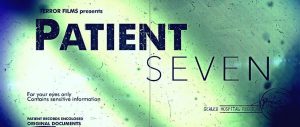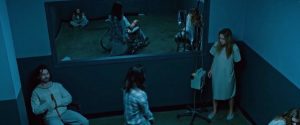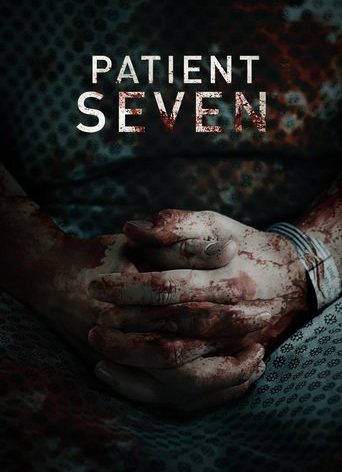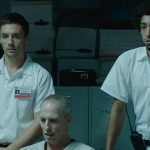Patient Seven, 2016
Patient Seven
Try to remain calm.
Images
This review may contain spoilers.

What a fine little discovery, surprisingly entertaining, Patient Seven holds back its punches at just the right moments and eventually a misstep or misjudged ethos of an anthology takes almost everything away from the film, almost. Plus it resonates with the antics of the 1972 British Amicus anthology film Asylum.

Michael Ironside (Scanners, 1981; Total Recall, 1990; Starship Troopers, 1997) is a bloody force to reckon with as Dr. Marcus, a psychiatrist researching for his upcoming book, interviews one patient after harassing another at the Spring Valley Mental Hospital.
The patients’ files read that all of them have a history of violence and the casualties were mostly family members, including the Spring Valley residents themselves. They are extremely dangerous; they are quite capable of causing harm to others and themselves. They are brought to the good doctor by two orderlies. The patients are bound by cuffs, feet-restraints, straitjackets. I mean they are seriously off the wall. And if that wasn’t enough, they live in a world filled with pure, unadulterated terror (but are coherent and placated enough to be grouped together in a single holding cell, what is this, the bar scene from Suicide Squad?)

“These patients suffer from a variety of mental health issues. Probably the most severe I’ve ever seen. Everything from paranoid schizophrenia, dream phobias and delusional disorders, causing nearly all of them to commit some terrible crime.” Says Dr. Paul Victor as he shows Dr. Marcus to the interview facility; a small room, filled with devious intentions.

Patient Seven is a collection of seven short films by different directors, which are wrapped together by a central theme: the interviews. The screenplay has all the potential for this picture to be something exceptional or even maybe nerve-rattling in its narration. But that isn’t so; Ironside and Amy Smart (segment: The Visitant) hold half the film, the rest of it is resting on the customised, sometimes problematic, back-stories without a consequence after the big reveal. The ending is of no contextual relevance to the confessional plot trappings, even with the big reveal to intervene like a bright red stop sign. That is what it is; the ending is a bloody stop sign after a pretty slick and bumpy ride.

It leaves a rather metallic taste in the mouth; having watched such nicely shot scenes that range from hunting vampires to flamboyant, opportunistic, mystical hit-men to fighting off zombies, demon possession, terrible acid trips, and the body of a twelve year old rotting in the closet. Which reminds me; it is most heart-wrenching to watch The Mother,from the segment: Evaded, transform and what ensues. Then there’s The Sleeping Plot with a little girl trying to collect money in the most ingenious ways for something she just has to get. That could be my favourite of the seven shorts. The funny in the ingenious and the morbid in the conclusion make for a terrific contradiction.

Patient Seven is pleasing in its little Nordic twists. Ironside is brutal, and the shorts are great in their individual presentations. The guy in Undying Love must be given more mainstream roles and, in the end, Patient Seven, like Identity, 2003 does not have the payoff of an adequate, leveraging last and final act. Having said that, it is an admirable film to watch, nonetheless.









